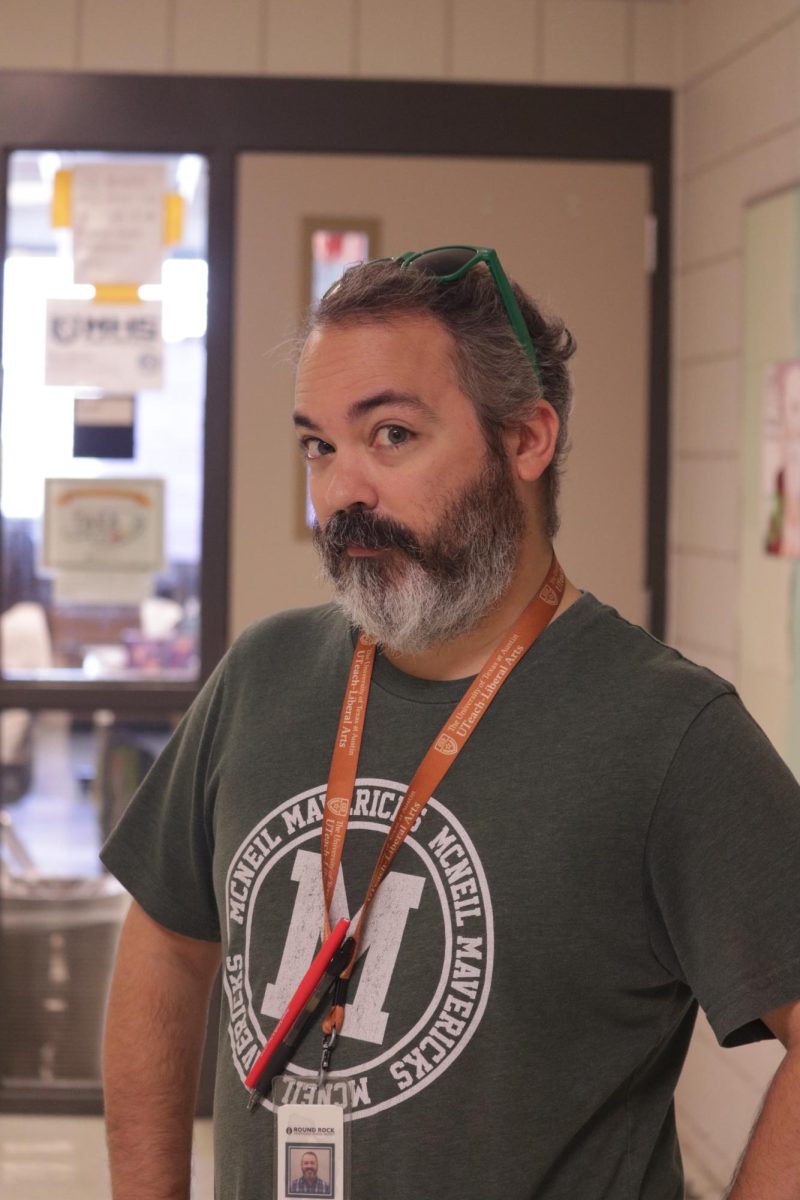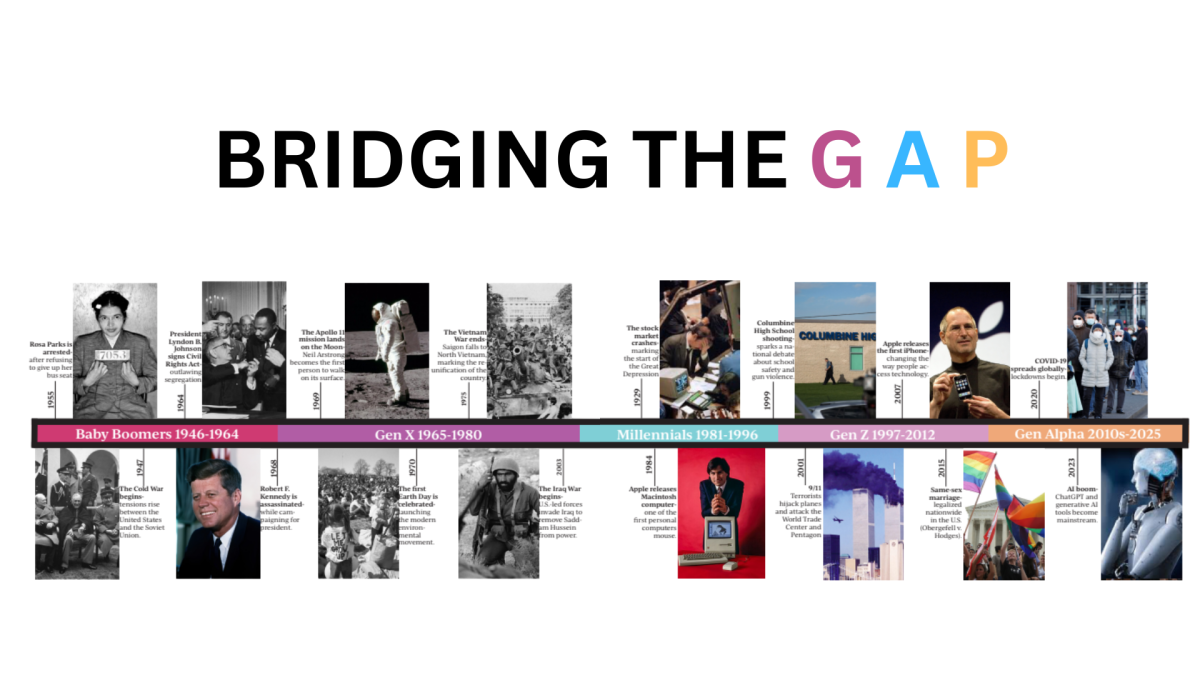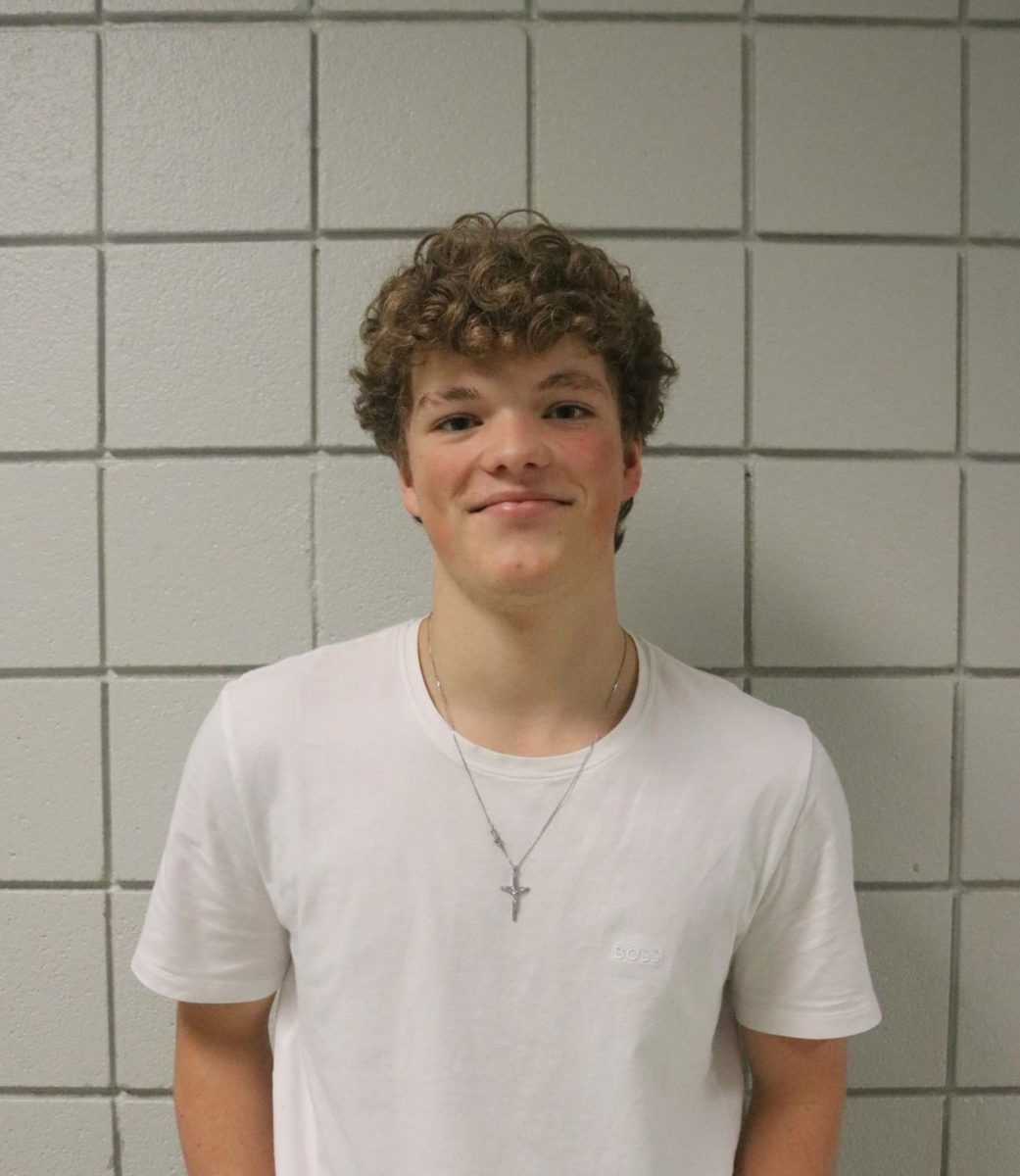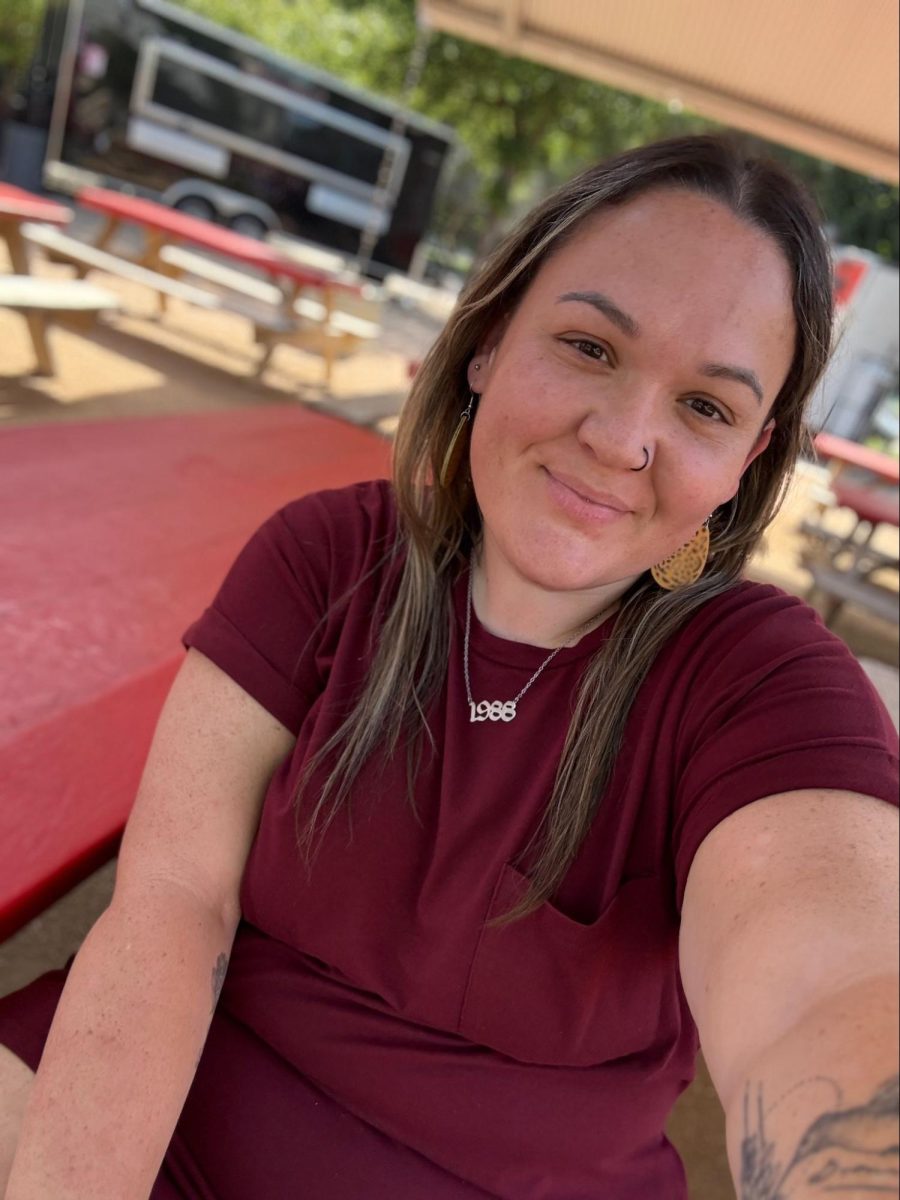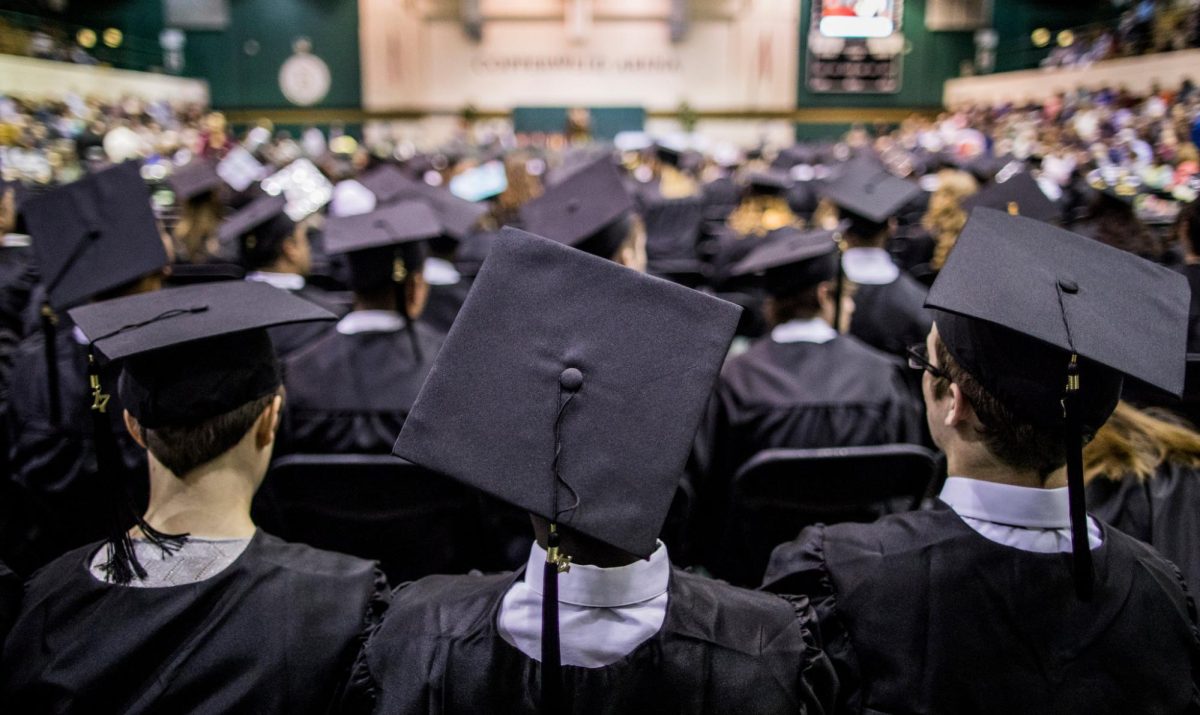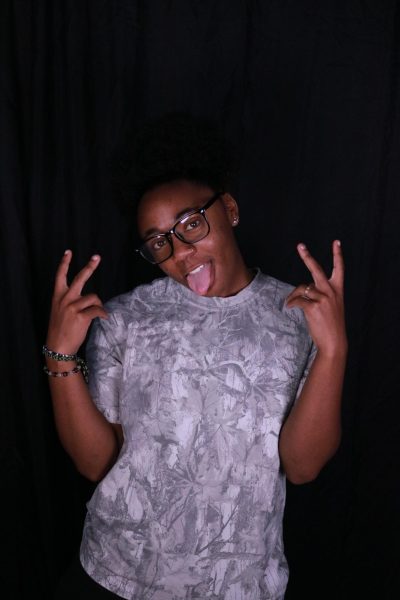Looking at the crowd shaking from nervousness, social studies and IB U.S. history teacher Robert Holmes builds up the courage to perform at open mic night. After rushing through his jokes within a minute and a half, he feels relief from the laughter he receives. The audience actually likes his jokes.
“I had a really good experience, even though it probably wasn’t that great,” Holmes said. “Two of the jokes that I debuted that night, [my] very first gig, they stuck with me for the rest of the time I did comedy. People enjoyed what I was doing.”
Previously, before Holmes started comedy, he worked at an indoor skydiving facility as an operations manager, iFly – where he met Waz, one of the flight instructors and the cause of the beginning of his comedy career.
“He’s just one of those dudes who’s completely fearless, always doing something,” Holmes said. “He has a clothing line. He was doing art. He was making music, and he was also the nicest guy. Anytime he was doing anything, he invited everyone.”
Waz occasionally attended this open mic comedy night and asked Holmes to attend with him. Holmes’ childhood dream was to at least try out comedy and make people laugh.
“I had dreamed of doing stand up comedy since I was eight,” Holmes said. “I grew up watching Comedy Central and I always wanted to do stand up comedy. I had nothing else going on [and] I had just moved back into Austin.”
Although Holmes had no jokes prepared, he still attended and started to perform at open mic nights. This became a routine where every Wednesday they would go. Now thinking about jokes and writing them down in his notebook.
“Instead of talking about my feelings or these personal tragedies that have happened with someone else, I decided to make jokes about it,” Holmes said. “That was how I healed from that. That is what started me doing stand-up. It was a way for me to process and have a good time, hang[ing] out with my buddy Waz.”
To encourage the audience, Holmes told bright life stories or about life tragedies to cope with them. His comedy acts went from a scale of topics. He talked about how strange his job can be and how life is being short to the reality of failed relationships.
“The thing about comedy is that there always has to be at least a grain of truth, but you also have to crank the absurdism so that way it becomes funny,” Holmes said. “It was me talking and trying to make light and make jokes about the things that were making me sad. It’s taking those things that were bumming me out and reframing it and turning into something I could laugh at. If I could make someone else laugh along the way, we’re doing a good thing there.”
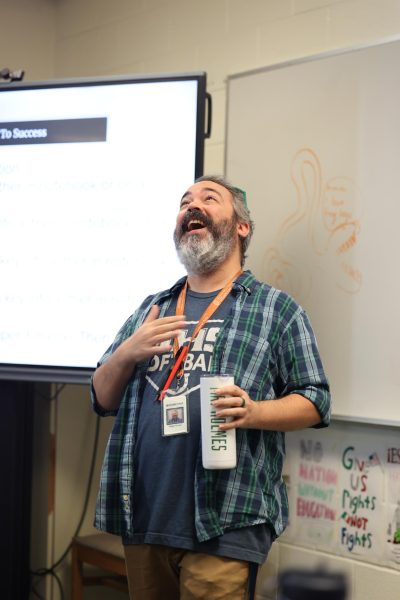
Growing up with two older sisters and fighting for the remote, whenever Holmes got the chance to put on what he wanted, he’d binge watch Comedy Central.
“I specifically remember when I was in high school, I got really into more absurdist comedy and character work,” Holmes said. “Where you build a character and that is the person you’re presenting on stage. Andy Kaufman, who was genuinely one of the greats of that process. He was very controversial for his time [and] was a big influence. Even today, I still have people that I look at and I see their comedy and that’s just phenomenal.”
Other comedians he finds hilarious and gets inspiration from are Bob the Drag Queen, Matteo Lane, Jeff Arcuri and Josh Johnson.
“Bob the Drag queen is an incredibly talented standup comedian as well who does incredible work,” Holmes said. “Jeff Arcuri, I don’t know anyone who does crowd work better than he does. It’s phenomenal stuff. As I started getting into [comedy, I] focused on crowd work, where you’re talking to someone in the audience and you’re having that conversation and then finding the joke.”
As Holmes advanced in comedy he focused on crowd work as his main jokes, having his set where he did traditional stand-up and transitioned into crowd work.
“I feel like crowd work is the best type of comedy,” Holmes said. “Crowd work is an essential element of any performance. Even if it’s not necessarily a comedy show, like you go and see WWE, crowd work is a big part. I really started focusing on crowd work and that was where I started having a lot of fun. This is one of the keys of comedy, they always tell you to find the joke.”
Early, Holmes went to different venues as a test to see which new jokes will be funny to the audience, then perform those at a much larger venue with a larger audience.
“You never know what you’re going to get with crowd work,” Holmes said. “You always have to be on your toes. With traditional stand up, once I had something, the joke works [and] it’s a crowd pleaser, then I would turn it into a staple of my comedy routine. If you got to perform [at Cap City comedy club,] that’s a big deal [and] only for the best material.”
Getting recognition from the show runners of the venues he’d go to, Holmes got the offer to perform for a paid gig at one of his joke-testing venues, receiving around $200 for a 20 minute set. His first paid gig.
“It was a great experience,” Holmes said. “It was of my full set that I’d been building for several months at that point of observations and stories from my life. I had all of my friends there. I had a huge support system that showed out just to support me [and] it was really fun. A visual representation of that support system that I had was really touching.”
With comedy not paying well enough and it only being a side career to make more, Holmes’ comedy career came to an end when the Coronavirus pandemic shut down everything. The Austin comedy community didn’t know how to continue in an artform that mostly happens in person.
“The community suffered greatly, like the comedy scene,” Holmes said. “It was no longer part of the routine. Life keeps marching, and I never tried to go back after things started to reopen.”
Throughout this time, Holmes returned to college to finish his bachelors while not giving up his scene in comedy. Quitting comedy was a changing of circumstances.
“I did get lucky [because] I transitioned to other things during COVID,” Holmes said. “I didn’t leave comedy necessarily because I was done. I left comedy because it was like COVID happened, everything shut down. Comedy was always just something fun to do, and it was a dream to try it and to experience it. It was never a thing where I was like, this is what I want to do for my entire life.”
Before the whole comedy scene, Holmes worked at Gamestop and looking at the way the company was going, he wasn’t so happy with it. He wanted to get a four year degree. With his notebook, he sat down and made a list of what’s important to him.
“The three big things that popped up was, I want to be able to have a family life,” Holmes said. “Holidays off, weekends off, home more or less by 5 to 5:30. I want to be able to have personal relationships. Then I also wanted something that was fulfilling, something that I felt good about doing, that I felt like I was making a difference. The third thing was, I want to be part of that community and I want to serve that community.”
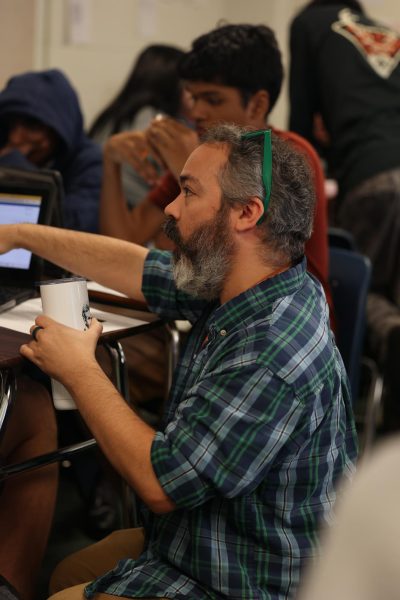
“I love the ‘why’s’ of storytellings,” Holmes said. “I love the art behind storytelling, which probably also says a lot about why I got into comedy because there’s an art for it. There’s a process, an art form to it. No thing we consume is created in a vacuum. Every song, TikTok, movie, book, TV show, like all of it is created with a story behind it. There’s a purpose. When we understand the history behind that, we’re able to understand those things better.”
Although COVID was one of the main factors that stopped Holmes in comedy, he also wanted to put more focus into perfecting his teaching.
“All of my time and all of my energy was going into teaching and perfecting that craft instead of focusing on perfecting my jokes and my comedy craft,” Holmes said. “There’s a surprising amount of overlap that happens there between comedy and teaching.”
After completing college, Holmes went straight into his teaching career in the year of 2023-2024. Showing his love for telling stories in his teaching and hearing student’s stories.
“My favorite thing about teaching is when I get to the point where you all tell me what you think,” Holmes said. “I have my perspective and I’ve experienced what I’ve experienced, but I don’t have what you’ve experienced. You have a unique lived experience, and so when you tell me what you think about something, your interpretation, then I get to learn too. I get to keep learning. I get to do that every day, which is fun.”
As a first year teacher and as the years are going on, Holmes is able to apply his love of comedy into teaching. It wasn’t so much quitting comedy, it was just shifting his audience.
“A lot of the things that I loved about comedy are the exact same things that I love about teaching,” Holmes said. “You see what works, you see what gets the laugh, you figure out the gestures, the voices, even the facial expressions. The next time you put it into practice, the exact same thing happens with teaching. You figure out the phrasing that works, the videos that make sense that you can build off of, you figure out the questions that get students talking about the topic, It’s very similar.”
Holmes tries to joke around with his students to make them feel comfortable in his classroom. Doing this, he connects with the students and gets them encouraged to learn.
“Laughing is a deeply social thing,” Holmes said. “Most of the time we are laughing because we are in a place where we are comfortable and we’re surrounded by people that we want to laugh with. If I can build that in my classroom [and] if I can get you comfortable to a point where you feel like you are free to laugh, then that means I’m doing what I feel like is my job as an educator, I’m getting you comfortable.”
Although his young dream came to an end and he is an educator, Holmes still reminisces about his time as a comedian. He still implements the comedic acts into his teaching with improv, crowd work, and storytelling.
“As much as I enjoyed doing comedy and doing open mic nights where there’s like no money involved, the purity of just making someone laugh for the sake of just making them laugh, I love just the idea behind that,” Holmes said. “I loved the community, but I get to do that here as well.”
Going into his third year of teaching and using those comedic strategies, Holmes has his routine down as a teacher and is always improving his techniques.
“I’ve changed every year because you have to,” Holmes said. “You’re improving things, just like comedy. So much of what we do in the classroom is very applicable to crowd work because you never know when someone’s going to ask a question that makes a good connection. You’re not prepared for it on your slides, but it’s worth having that discussion about and following your train of thought as a student. I think [comedy] helped prepare me in a very good way.”

